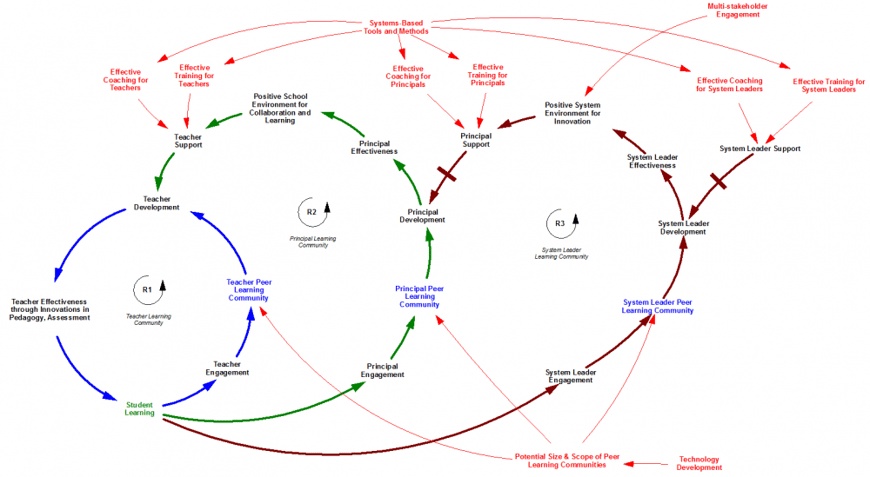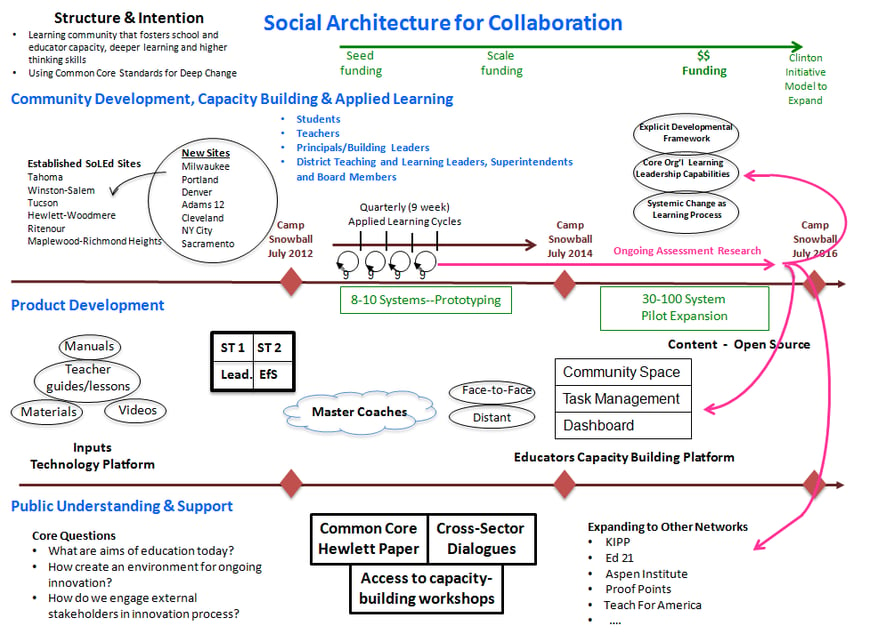Changing education at scale: lessons from Camp Snowball
Camp Snowball, a program supported by Reos Partners, is building students and educators’ capacity for systems thinking to better navigate the complexity of the world they are inheriting.
For the past two summers, Reos Partners has joined with the Waters Foundation Systems Thinking in Schools Project, SoL Education Partnership, Cloud Institute for Education for Sustainability, and Creative Learning Exchange to co-create a multi-faceted camp program designed to build students’ and educators’ capacity in systems thinking, education for sustainability, youth engagement, and organisational learning while building a learning community to support them after camp is over. By embedding these toolsets system-wide – in classrooms, schools, school districts, and communities – we hope to create better student outcomes.
What started out as a capacity- and network-building event has now grown into a large-scale collaborative effort that builds on the newly adopted Common Core State Standards (CCSS) for K-12 education in the United States. This moment represents a rare opportunity for significant shifts in public education – an opening for innovation in curriculum and pedagogy that can help students develop the higher-order skills they need in the 21st century. The standards alone won’t improve learning, however. To make real progress over the long term, we must create organisational cultures that support innovation and leadership capacity building at every level, which in schools means administrators, teachers, students, parents, boards, and community members. In addition, the CCSS specify what skills students need to learn, not how to teach them, which leaves wide open the opportunity for helping educators to develop the necessary strategies.
Our core hypothesis is that emerging know-how in whole systems change and high-leverage capacity building, combined with innovation in curriculum, pedagogy, and assessment, can deepen and accelerate the efforts of school leaders intent on using the CCSS to initiate and sustain transformational change in public education. Our thinking is grounded in the understanding that a whole systems approach is a radical departure from the pedagogical paradigm that has held sway for more than a hundred years, in which learning comes from dissecting the whole – whether a frog or a sentence – into its component parts. But parts alone are not enough to enable us understand the whole. Systems thinking – with a set of strategies, tools, and ways of thinking that have been tested for more than 30 years in a wide variety of systems – is essential for improving student achievement and closing the achievement gap.
This project has three phases:
- A Prototyping phase that allows us to test and refine our approach in approximately 15 districts and three content areas. At the same time, we are beginning the development of a scalable social architecture that will enable the capacity-building model we are implementing to become widely available and more usable.
- A Controlled Scaling phase that will engage 15-50 additional school systems and additional content areas.
- An Open Enrollment phase that will involve a minimum of 100 districts and will rely on the social architecture’s technology platform.
During the Prototyping phase, we will focus on three key challenges posed by the CCSS: early reading, middle school math (algebra, ratio, and proportion), and comprehension of complex non-fiction texts in high school. In the Controlled Scaling phase, we will add more content areas.
Our scalable social architecture focuses on community development, capacity building, applied learning, and product development. We will develop curriculum units, a technology platform, and learning networks for all stakeholders using in-person and distance learning. We will focus both on classroom innovation and learning-oriented school cultures. And we will ground capacity building in best practices and continual assessment of progress.
Our approach is based on examples of clear success from earlier work and on the most recent learnings and new insights we and others have gained. We have long known, for example, that personal change is inseparable from organisational change, so our capacity-building and support structures focus on personal development in a deep way.
Our work is not about helping school districts strictly implement the Common Core State Standards. There are many organisations out there doing just that. We are transforming the larger system through which the intention of the Common Core can succeed. We are creating the conditions that will enable teachers to reach their highest potential and effectiveness, thereby increasing what all students can do and become. We are developing a culture of ongoing innovation.
Billions of dollars have been spent on school reform over the past several decades, too much of it on top-down approaches. Surprisingly little attention has been paid to what we know about how to build resilient, innovative organisations in which all participants take responsibility for achievement. We are trying to change that deficit. We can develop in our school systems the ability to engage in high-level thinking and creativity, which are surely needed if our students are to succeed in an increasingly complex world.
Join us at the third annual Camp Snowball in Winston-Salem, North Carolina, July 22-26, 2013. www.campsnowball.org

